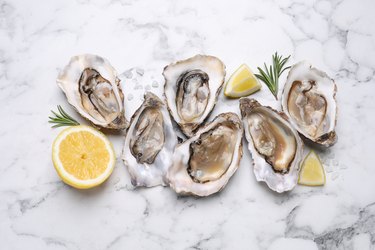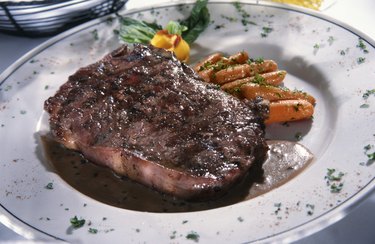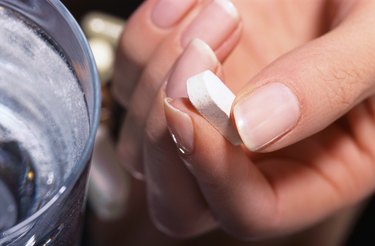
Zinc, a trace element naturally found in foods such as oysters and beef, helps with numerous health functions, including immune system maintenance and wound healing, according to the U.S. National Library of Medicine (NLM).
The human body does not store excess zinc, so it must be consumed regularly in order to prevent zinc deficiency. Unfortunately, some foods and supplements block zinc absorption. Whether you're getting all of your zinc through dietary sources or are taking a zinc-enhanced supplement, you can ensure optimal zinc absorption by understanding how this mineral interacts with other substances.
Video of the Day
Video of the Day
Meat vs. Plant Sources

Oysters are by far the most zinc-rich food: According to the National Institutes of Health, 3 ounces of oysters contains 74 milligrams of zinc — or 673 percent of the recommended daily value. As research from Oregon State University's Linus Pauling Institute points out, the zinc in foods like oysters, red meat and eggs is more bioavailable, meaning that your body can more readily absorb and use it. This is because animal proteins improve zinc absorption.
By contrast, vegetarian foods that contain zinc — such as legumes, whole-grain breads and cereals, bran and other fiber-rich foods — are high in phytates, which inhibit zinc absorption. Per the Harvard T.H. Chan School of Public Health, phytates are anti-nutrients. "In plants, they are compounds designed to protect from bacterial infections and being eaten by insects," note researchers.
Zinc Supplements

Zinc is considered a trace element or micronutrient because humans only need a small amount of it, according to Merriam-Webster. The Mayo Clinic recommends getting 8 to 11 milligrams of zinc per day — a dosage usually met naturally through the foods you eat.
That said, Mayo observes that people with low zinc levels and those showing the early symptoms of a cold may benefit from taking zinc supplements. Before taking oral zinc, however, speak to your doctor: Thiazide diuretics and antibiotics like tetracycline and quinolone can interfere with zinc absorption and negate the supplements' positive effects. In addition, too-high doses of zinc can result in copper deficiency and/or nausea.
Zinc absorption happens in the small intestine, as described by a guide published in the March 2020 issue of the journal Nutrients. Therefore, taking your zinc supplement with a meal or snack will facilitate proper ingestion.
Zinc vs. Other Supplements
The NLM recommends taking zinc supplements with food for another reason as well: "Iron and zinc [supplements] can interfere with each other's absorption," they write. Taking these supplements with food can help you avoid this effect.
"It is clear from the ... evidence that [zinc and iron] do interact negatively when supplemented together," observed researchers in an August 2019 Nutrients article. "Further investigations are warranted to understand the nexus between these important minerals."
Calcium supplements, too, can affect the absorption of zinc supplements, according to Mayo. They recommend taking these supplements at different times of the day, preferably at least two hours apart.
- U.S. National Library of Medicine: "Zinc"
- Oregon State University Linus Pauling Institute: "Zinc"
- Harvard T.H. Chan School of Public Health: "Are Anti-Nutrients Harmful?"
- National Institutes of Health Office of Dietary Supplements: "Zinc"
- Mayo Clinic: "Zinc"
- Merriam-Webster: "Trace Element"
- Nutrients: "A Guide to Human Zinc Absorption: General Overview and Recent Advances of In Vitro Intestinal Models"
- Nutrients: "Iron and Zinc Homeostasis and Interactions: Does Enteric Zinc Excretion Cross-Talk with Intestinal Iron Absorption?"
- Mayo Clinic: "When Should I Take Calcium Supplements? Does the Timing Matter?"